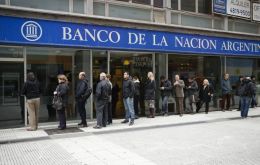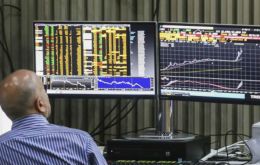MercoPress. South Atlantic News Agency
Tag: economy
-
Thursday, March 21st 2019 - 09:55 UTC
Mexico and Brazil agree on a free trade for light vehicles

Mexico’s government said it had reached an agreement with Brazil on the free trade of light vehicles, subject to a 40% regional content requirement, paving the way for more open commerce between Latin America’s two biggest economies.
-
Tuesday, March 19th 2019 - 08:43 UTC
Brazilian stocks topped 100.000 points for the first time on the Bolsonaro syndrome

Brazilian stocks topped 100,000 points for the first time Monday, on hopes for progress in President Jair Bolsonaro's promised pro-market reforms. The Ibovespa, the country's main index in Sao Paulo, hit an intra-day record of 100,037.69 before closing at its highest level ever of 99,993.93, up 0.86% from the previous trading session.
-
Friday, March 15th 2019 - 08:48 UTC
Argentine inflation in February, 3.8% and 51% in twelve months; central bank new measures

Argentina’s stubbornly high inflation accelerated again in February, the government said on Thursday, sparking the central bank chief to pledge new measures to rein in rising prices that have dogged the South American economy over the last year.
-
Thursday, March 14th 2019 - 09:46 UTC
China's industrial growth output fell to a 17-year low in Jan/Feb

Growth in China’s industrial output fell to a 17-year low in the first two months of the year, pointing to further weakness in the world’s second-biggest economy that is likely to trigger more support measures from Beijing.
-
Wednesday, March 13th 2019 - 09:20 UTC
UK economy performance weak: 0.2% expansion in three months to January

The UK economy grew by 0.2% in the three months to January, matching the growth of the previous three months. The report from the Office for National Statistics (ONS) showed a pick-up in activity in January when the economy expanded by 0.5%.
-
Wednesday, March 13th 2019 - 09:11 UTC
Despite credit agencies forecasts, Mexican economy growing says president Lopez Obrador

Mexican president Andres Manuel Lopez Obrador said that there are no signs of an impending recession despite slow economic growth, adding that his flagship infrastructure projects are on track.
-
Wednesday, March 13th 2019 - 08:12 UTC
Brazil February consumer prices rose 0.43%, and 3.89% in twelve months

Consumer prices in Brazil rose at a slightly faster pace than expected in February due to a rise in private education fees and food and beverage prices, statistics agency IBGE said on Tuesday. On a monthly basis, inflation rose by 0.43% in February, IBGE said, more than the expected 0.39% and up from 0.32% a month earlier.
-
Friday, March 8th 2019 - 08:58 UTC
Argentina's Peso hit a record low to the dollar weakening 4%

Argentina’s struggling currency hit a record low against the dollar on Thursday, weakening over 4% to close at 42.5 pesos per dollar, a challenge for President Mauricio Macri as he looks to right the economy ahead of elections in October.
-
Thursday, March 7th 2019 - 09:53 UTC
Argentina and Brazil markets open Wednesday with steep losses

Latin American stocks hovered near 2019 lows on Wednesday led by steep losses in Argentina and Brazil which resumed trading after a two-day Carnival holiday, while currencies of oil exporters in the region fell as crude prices came under pressure. MSCI's index of Latin American stocks fell 1.3%, tracking losses across the region, barring Chile and Colombia which ended higher.
-
Thursday, February 28th 2019 - 09:15 UTC
US trade deficit widens sharply in December: imports increase, exports drop

The US trade deficit widened sharply in December as slowing global demand and a strong dollar weighed on exports, another sign that economic growth slowed in the fourth quarter. Other data from the Commerce Department on Wednesday showed new orders for US-made goods barely rose in December and business spending on equipment was much weaker than previously thought, pointing to a softening in manufacturing activity.
